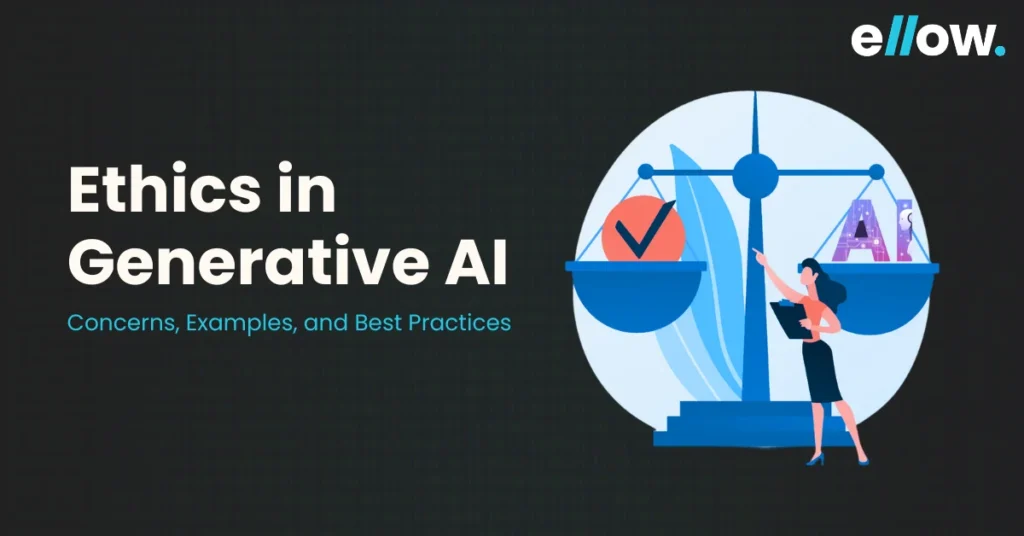As artificial intelligence (AI) continues to evolve, so are the ethical considerations surrounding its development and implementation. One area of particular concern is generative AI, which creates new content, such as text, images, or music, based on patterns and data it has been trained on.
In this article, we will look into the ethics of generative AI, exploring the moral implications and challenges that arise from its use.
Generative AI raises questions about intellectual property rights, bias in data, and the potential for misuse or manipulation. Understanding and addressing these ethical concerns is important to ensuring that generative AI technologies are developed and utilized responsibly, without causing harm to individuals or society at large.
By examining these issues, we can strive to harness the power of generative AI for the betterment of humanity while mitigating its risks. Pew Research highlights the growing public concern regarding the impact of artificial intelligence on daily life.
What is Generative AI?
Generative AI is an advanced aspect of artificial intelligence (AI) that empowers machines to create fresh content by drawing upon existing content, spanning text, audio, video, and code. This technology is rapidly gaining traction, fueling numerous innovative applications across various sectors.
For instance, it’s revolutionizing content creation in media and marketing, expediting and enriching healthcare services with personalized treatments, and revolutionizing educational methods through adaptive learning.
According to a survey by the Pew Research Center, about 63% of Americans express concerns about the use of AI in hiring, worrying it might lead to biased decisions or unfair treatment. This underscores the significance of understanding and responsibly implementing generative AI technologies in various domains.
The article in Fortune explores the impact of AI on job markets, shedding light on strategies for navigating this evolving landscape. It discusses the challenges and opportunities presented by AI integration in various industries.
Ethical Concerns Associated with Generative AI
1. Misinformation And Deepfakes
Generative AI can create content that blurs the lines between reality and fiction, leading to the spread of misinformation and the creation of deepfake videos. This can harm individuals and organizations by distorting public perception and fueling propaganda.
To address this, companies must invest in tools to identify fake content and raise awareness among users about the existence and risks of deepfakes. Collaborating with third-party fact-checkers can also help in reviewing and removing potentially misleading content.
2. Bias And Discrimination
Generative models can continue biases present in the datasets they are trained on, leading to unfair discrimination. For example, biased facial recognition software may wrongly identify individuals, causing legal issues and reputational damage.
The latest example is Google’s Gemini, which faced criticism when users discovered that it was creating historically inaccurate images. These included depictions of Black Vikings, an Asian woman wearing a German World War II-era military uniform, and a female Pope.
To mitigate this, it is important to prioritize diversity in training datasets. Also, conduct regular audits to identify and rectify unintended biases. Partnering with organizations that specialize in bias checks and audits can further ensure the fairness of generative AI systems.
3. Copyright And Intellectual Property
Generative AI’s ability to replicate copyrighted materials raises concerns about intellectual property infringement, potentially leading to legal disputes and reputation damage.
To prevent unintentional infringements, companies should ensure that training content is properly licensed and transparently document how generated content is produced. Implementing metadata tagging in training data can help trace the origins of generated content, reducing the risk of copyright violations.
4. Privacy And Data Security
Generative models trained on personal data pose privacy risks, as they may generate synthetic profiles that closely resemble real individuals. This can lead to breaches of user privacy and legal consequences, such as violations of data protection regulations like GDPR.
To safeguard user data, anonymizing data during training and implementing robust data security measures, such as encryption, is essential. Adhering to principles like GDPR’s data minimization can also help minimize the risk of privacy breaches.
5. Accountability
The complex nature of generative AI makes it challenging to assign responsibility in case of mishaps, leading to legal complications and damage to brand credibility.
Establishing clear policies on the responsible use of generative AI, similar to platforms like X (formerly known as Twitter), can help clarify boundaries and ensure accountability. Additionally, implementing feedback mechanisms for users to report questionable outputs can aid in addressing issues promptly.
6. Workforce Roles and Morale
The adoption of generative AI may lead to concerns about job displacement and the need for upskilling or reskilling workers to adapt to new roles.
While generative AI offers opportunities for increased productivity, companies need to prioritize measures to support and retrain workers affected by automation. This can help mitigate negative impacts on workforce morale and ensure a smooth transition to the AI era.
7. Lack of Transparency
The opaque nature of AI systems makes it difficult to understand their decision-making processes, leading to uncertainty and unpredictability.
To address this, researchers and developers need to work on enhancing transparency in AI systems, including understanding emergent capabilities and factors influencing decision-making. This can help improve trust in generative AI and ensure accountability for its outcomes.
Examples of False Information Created by Artificial Intelligence
1. False Political Claims circulate on Twitter
According to a study reported by The Verge, AI-generated content, particularly on platforms like Twitter, is spreading false political claims. This misinformation can easily mislead users, as demonstrated by the study’s findings. It underscores the concerning potential for AI to amplify disinformation, contributing to public confusion and discord.
2. Fake News Incites Tensions in Legal Proceedings
In a recent court case covered by BBC News, a lawyer cited an AI-generated example as evidence, unaware that it was fabricated. This incident highlights the alarming consequences of relying on AI-generated content in legal proceedings. Such misinformation can undermine the integrity of the legal system and lead to unjust outcomes.
2. UN Warns Against AI-Generated Deepfakes and Hate Speech
The United Nations has expressed concerns about the proliferation of AI-generated deepfakes and hate speech, as reported by Decrypt. These deceptive videos and inflammatory messages can exacerbate societal tensions and incite violence. The UN’s warning underscores the urgent need for measures to combat the spread of AI-generated misinformation, which poses significant risks to global peace and security.
Best Ways to Use Generative AI Ethically
1. Stay updated and make a difference
Stay updated by staying informed about the latest advancements in Generative AI. This means knowing how it works and understanding its ethical implications. Taking proactive steps ensures that you’re using Generative AI responsibly, whether you’re an individual user or part of an organization, making a positive impact in its application.
2. Adhere to international norms
Adhering to international norms means following established standards like the UNESCO AI ethics guidelines. These guidelines emphasize values like human rights, diversity, and environmental sustainability. By aligning with such norms, we ensure that Generative AI is developed and used responsibly, promoting fairness and societal well-being.
3. Participate in ethical AI networks
Participating in ethical AI networks, like AI Ethics Lab and Montreal AI Ethics Institute, helps enhance understanding of responsible AI use. These communities focus on principles like transparency and accountability, fostering discussions to ensure AI benefits everyone safely. Joining such networks aids in staying informed and contributing positively to AI ethics.
4. Foster mindfulness and acquire knowledge
Fostering mindfulness and acquiring knowledge involves staying aware of the limitations and risks of Generative AI. It means critically assessing AI-generated information, verifying its authenticity, and understanding its potential consequences before use. Continuous learning and awareness are vital for making ethical decisions when utilizing AI technology.
Conclusion
The impact of generative AI extends far beyond technological advancements. Businesses must recognize the ethical implications intertwined with its use, as failure to do so poses significant risks. Beyond moral considerations, neglecting these issues jeopardizes brand reputation, user confidence, and financial stability.
Moving forward, businesses must prioritize awareness and understanding of the ethical challenges associated with generative AI. Once identified, proactive measures such as implementing robust policies and processes are crucial in promoting responsible usage.
Additionally, advocating for transparency and nurturing a culture of ethical AI utilization both internally and externally is imperative.
Success isn’t solely measured by what can be created, but also by the ethical framework guiding its creation. Companies leading this revolution bear a profound responsibility. It’s not only a call for innovation but also a demand for introspection and ethical leadership.
Let’s embrace this responsibility and navigate the path ahead with integrity and foresight.
Recommended Reads
Generative AI vs. Predictive AI: What is the difference?
Top AI in Hiring Statistics in 2024
AI in Recruitment: A Definitive Guide
FAQs
What are some ethical concerns surrounding generative AI?
Ethical concerns include issues such as biased outputs, potential misuse for malicious purposes, and the creation of deceptive content.
How can bias manifest in generative AI systems?
Bias can manifest in generative AI systems through biased training data, biased algorithms, or biased human inputs, leading to discriminatory outputs.
What steps can businesses take to address ethical considerations in generative AI?
Businesses can address ethical considerations by implementing diverse and representative training data, conducting regular audits for bias, establishing clear guidelines for ethical AI use, and fostering a culture of responsible AI development and deployment.
Are there regulatory frameworks in place to govern the ethical use of generative AI?
While there may not be specific regulations dedicated solely to generative AI, existing frameworks such as data protection laws and ethical guidelines for AI development provide a foundation for governing its ethical use.
How can transparency be maintained in the development and deployment of generative AI systems?
Transparency can be maintained through clear documentation of AI processes and algorithms, disclosing the limitations and potential biases of AI systems, and enabling mechanisms for users to understand and challenge AI-generated content.









